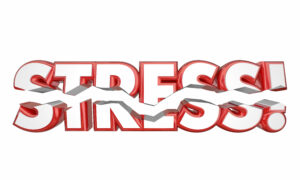
Stress Word Breaking Strain Mental Emotional 3d Illustration
Have you ever experienced a tight stomach, tense muscles, or restless nights? Do you find yourself easily frustrated with others? These are common symptoms of stress that can have detrimental effects on our well-being, both physically and emotionally.
We don’t often fully grasp the impact of stress on our behaviors and overall health. An often-referenced study showed that 38 percent of adults resort to overeating or consuming unhealthy foods as a response to stress in the past month prior to the survey.[1] Even more concerning, several studies indicate that people turn to drugs, alcohol, or tobacco use when under stress. Additionally, stressed individuals are more prone to angry outbursts, and exhibit altered behavior.
Stress is not only an individual experience. Like germs, it can be contagious.[2] Have you ever observed someone pacing the room and felt a sense of unease yourself? Or perhaps watching the news has made your blood boil? Research conducted in Germany involved pairing 362 people together, with one person exposed to a stress-inducing situation like a mock job interview, while the other person observed from behind a one-way mirror. As expected, 95 percent of the interviewees experienced an increase in cortisol, a primary stress hormone. However, the surprising finding was that approximately 30 percent of the observers also had elevated cortisol levels simply from watching the stressful situation unfold.
This highlights the importance of recognizing and addressing our own stress, particularly for those in leadership or caregiving roles, to avoid projecting stress onto others. Those who engage with patients can also look for opportunities to help patients manage their stress levels effectively.
Renowned American author Charles Swindoll once said, “Life is 10 percent what happens to me and 90 percent of how I react to it,” emphasizing the role of our reactions in shaping our experiences. As an expert in behavior change, I teach techniques that enable individuals to evaluate their current stress levels, identify triggers, understand self-generated stress, and learn effective stress reduction strategies. I also train healthcare professionals and leaders in addressing stress with team members and patients. The stakes in healthcare are high for the organizations, the medical experts, and the patients. April 2023 marks the start of a six part blog series here, “From Tension to Flow,” so be sure to check back to learn some of the helpful tips I use in my trainings for healthcare professionals.
It is crucial to enhance the integration of cost-effective and time-efficient stress management strategies for the benefit of all. However, it is important to acknowledge that despite patients and healthcare professionals’ diligent efforts to address their stress levels, certain systemic changes are required that surpass the scope of stress reduction strategies.
[1] https://www.apa.org/Images/2013-sia-Eating-Infographic-1024_tcm7-166596.jpg
[2] https://www.ncbi.nlm.nih.gov/pmc/articles/PMC5522461/

